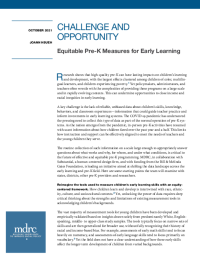Challenge and Opportunity
Equitable Pre-K Measures for Early Learning

 Research shows that high-quality pre-K can have lasting impacts on children’s learning and development, with the largest effects clustered among children of color, multilingual learners, and children experiencing poverty. Yet policymakers, administrators, and teachers often wrestle with the complexities of providing these programs on a large scale and in rapidly evolving contexts. This can undermine opportunities to close income and racial inequities in early learning.
Research shows that high-quality pre-K can have lasting impacts on children’s learning and development, with the largest effects clustered among children of color, multilingual learners, and children experiencing poverty. Yet policymakers, administrators, and teachers often wrestle with the complexities of providing these programs on a large scale and in rapidly evolving contexts. This can undermine opportunities to close income and racial inequities in early learning.
A key challenge is the lack of reliable, unbiased data about children’s skills, knowledge, behaviors, and classroom experiences—information that could guide teacher practice and inform investments in early learning systems. The COVID-19 pandemic has underscored the pressing need to collect this type of data as part of the normal operation of pre-K systems. As the nation emerges from the pandemic, in-person pre-K activities have resumed with scant information about how children fared over the past year and a half. This limits how instruction and support can be effectively aligned to meet the needs of teachers and the young children they serve.
The routine collection of such information on a scale large enough to appropriately answer questions about what works and why, for whom, and under what conditions, is critical to the future of effective and equitable pre-K programming. MDRC, in collaboration with Substantial, a human-centered design firm, and with funding from the Bill & Melinda Gates Foundation, is leading an initiative aimed at shifting the data landscape across the early learning and pre-K field. This brief presents some starting points the team will examine with states, districts, other pre-K providers, and researchers.






